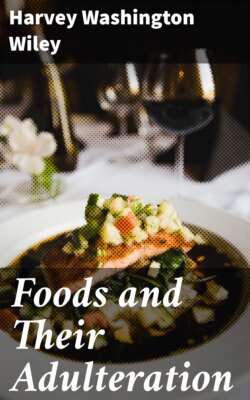Читать книгу Foods and Their Adulteration - Harvey Washington Wiley - Страница 59
На сайте Литреса книга снята с продажи.
Parboiling.
Оглавление—After the pieces have been selected and dressed they are parboiled before being sterilized. The time of parboiling varies in different packing establishments from eight to twenty minutes, according to the size of the pieces of meat. In some cases a uniform time for parboiling is prescribed, irrespective of the size of the pieces. One of the principal reasons for parboiling the meat is to secure the shrinkage, which always takes place on heating, before the meat is placed in the tins.
The experiments have shown that meats when put in tins in a fresh state and sterilized shrink to about two-thirds of their original volume. Parboiling is, in the essence, a process of shrinking. When the meat is put at once into boiling water there is less loss of protein matter than when the meat is placed in cold water and heated gradually. The substances removed in parboiling are water, fat, soluble mineral matter, and the meat bases. The fat is removed by becoming rendered, and rises to the surface where it can be skimmed off. A little over one percent of the protein content of meat is lost by parboiling while the total meat bases lost amount to almost one-third of the total quantity contained in the meat. Of mineral matter in the meat as high as 50 percent is lost in parboiling.
By shrinking, parboiling tends to make a more concentrated article and thus favors transportation. Practically the nutritive value of a pound of properly canned beef is about one-third greater than that of one pound of the fresh beef of the same kind. Hence parboiling may be regarded as a perfectly legitimate and desirable process without which the beef could not be properly prepared for canning.
